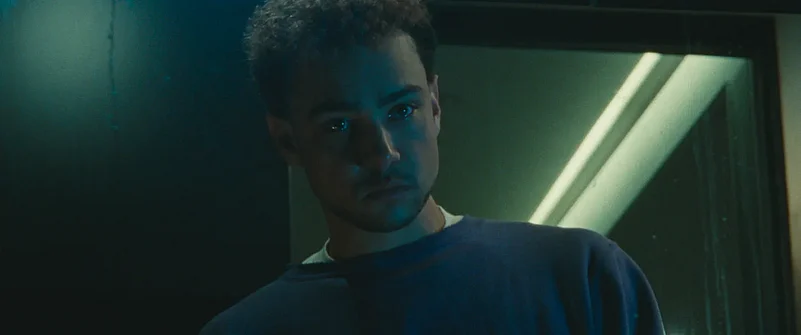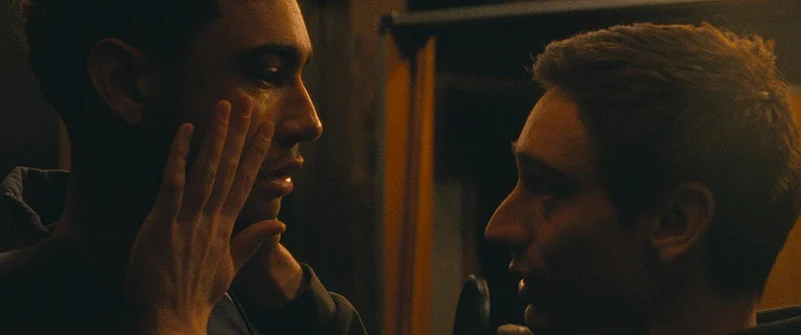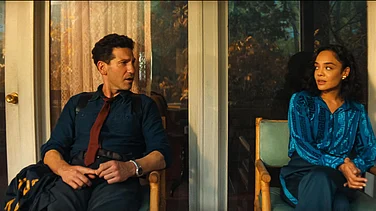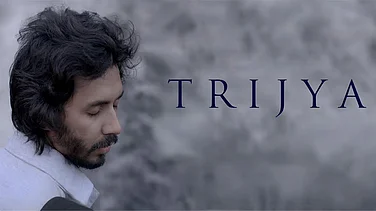
Alex Russell, writer on The Bear and Beef, makes his directorial debut with Lurker
Starring Theodore Pellerin and Archie Madekwe, Lurker prises through obsession driven to its tether
The film is streaming on MUBI
When a fan sneaks inside a star’s clique, how deep can a trail of imbalance run? That’s one of the central questions Alex Russell poses in his directorial debut, Lurker. The director, who has been a writer on The Bear and Beef, displays a canny understanding of the knife’s edge between adoration and discomfort. Tables turn with startling swiftness in this film, as it lurches across unnerving degrees of narcissism and reflection.
Russell wastes no time with the initiation. In the opening, Théodore Pellerin’s Matthew, an LA clothes store worker, makes a quick, blazing impression on a visiting pop star Oliver (Archie Madekwe). Matthew pretends not to be versed with Oliver’s stardom. Rather, he puts a song on the speaker that’s been on Oliver’s socials and instantly tugs him close. Oliver tells him he feels a kinship with his taste, and insists on Matthew’s presence at his concert.

Witnessing Oliver perform, the awe on Matthew’s face gradually contorts into repressed envy, lashing rage. A stray scrap of affection that Oliver tosses him becomes Matthew’s sole sustenance. But it has to endlessly stave off racing insecurities, the swerve of Oliver’s fondness switching people. What happens once slavish devotion is brusquely reminded of its place and very tangible ends? The brink of a fan’s thrusting demand is riven with menace in the shadows—“snakes in the garden” as goes one of Oliver’s songs. As Matthew insinuates himself in Oliver’s space, landing right at his home after the performance, Lurker skids on a delicious moral tightrope. Upstaging others who are also vying for Oliver’s attention is Matthew’s ultimate sign of being seen.

Matthew starts out as diffident and someone who Oliver’s cabal doesn’t think twice before summarily dismissing. He does what he’s ordered with glad, grateful obeisance. He quickly takes to heart words of Shai (Havana Rose Liu), one of Oliver’s constants. If he is to stick around, he must make himself useful to Oliver. It’s the unspoken cardinal rule of earning Oliver’s fickle company. So Matthew primes himself as the videographer. Russell shows spiky skill in men bulldozing one another, all to be secure in Oliver’s immediate group. To ensure one stays rooted as the loci of his wavering attention is to be on a treadmill of self-abnegation. Individual ego must be demolished at the feet of Oliver, who simply takes anyone for a ride. In a telling exchange with Matthew, Oliver insists he now has the power to choose his family, those he’d keep close, having come from askew roots. Oliver assembles and pulls apart his circle with equally callous impulsiveness. He assures they’re everything to him at one moment, only to promptly discard them once there’s the slightest of disagreement. It’s a constant losing game of shifting fancies. With him, things can disrupt and blow up any time. One’s disposability is forever in the air. Oliver iterates he’s the powerful one in the equation, with the means to do whatever he pleases. Getting to be around him is in itself the biggest privilege, granting unheralded social capital. But Matthew redraws these rules of engagement.

Russell pinpoints this volatility through an intensifying, watchful duel between Matthew and Oliver. Pellerin’s steady gaze thrums with disconcerting energy. It’s the kind of attention that should make anyone queasy, but Oliver is initially too swept up in waves of devotion he whets. At one point, he laughingly calls one of them his disciple. But it could very well hold up in earnest. Oliver is incredibly selfish, unhesitant to tune his friends as stooges. They know the bargain and move accordingly.

Matthew waits hours on end, gets doled housekeeping duties. He buries any rising objection for the promised reward: more time to be around Oliver. Lurker flips through these precursor rites to intimacy with Oliver in taut beats. Russell isn’t exactly breaking fresh ground here. There’s quite a bit of familiarity with the careening drama, but Pellerin and Madekwe retain a fine magnetism.

This fiendishly riveting film never loses sight of ethical tension and its hulking human anxieties. An incipient crisis of attention shades the unravelling. There are two ways for Lurker to head. Russell could have nosedived into the plummeting circumstances, tacking one horror after the other. The other and the more intelligent one, which he takes, is a mindfulness to extreme needs to please and maw off the other. There’s a mutual mean usage. It’s Matthew’s perspective that holds primacy over the telling, but through elisions, one notices temperature shifts in the room as he gains greater control. Watch how, within an unaffected front, Pellerin’s face hardens over Matthew being passed over, shuffled aside. His stature expands from diminutive to one sparking fear and authority in his own skewed way. His tentativeness takes on darker edges, a certitude in tight unease he unleashes gleefully. His desperate smile barely disguises the mesh of affirmation he’s after. Later, when someone calls him a fan, he recoils. He’s already forged his way in, ascended the ladder.
David Kashevaroff’s taut edit pilots Lurker through the messy business of obsession and spurning. Here, the object of obsession very much recognises his intoxicating influence, without fathoming the chilling, manipulative shape it can kindle. Russell unsheaths this with a viper’s bite, Kenny Beats’ score liming the film’s psychological hairpin bends. Madekwe wields unshakable sex appeal, a haughty allure, a reckless ease with casual cruelty that gets increasingly eroded by welling alarm. Lurker does get wobbly and meandering in latter stretches, but an excellently judged, nifty ending sharpens its early insight into parasocial absorption. This is a prickly, devilish little treat of a film.




























